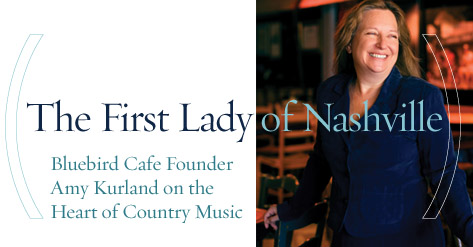
By Laura Ewald
Photos By Daniel Dubois
Underneath the awning of a cafe
tucked into a strip mall on the outskirts of Nashville
is a wooden plaque, easily missed by the untrained
eye: “The best songwriters in the world
pass through this door.” A bold statement
even in a city big on bold statements, it is nonetheless
true—from Garth Brooks and Trisha Yearwood
to the poets behind today’s biggest country
(and pop, rock, Latin, and instrumental) hits,
countless songwriters and recording artists call
the Bluebird Cafe home.
Founder Amy Kurland, BA ’77,
is one of the most influential people in what
many consider the music capital of the world.
I Feel Lucky
Kurland runs, as singer-songwriter Karen Staley
puts it, “the Ellis Island of Nashville,”
hosting open mic nights, auditions, and booking
new writers and artists to perform at the Bluebird
and with affiliated touring shows. She has rolled
out the welcome mat for the unheard and unsigned
since 1982 when the Bluebird opened far off “Music
Row,” the area southwest of downtown Nashville
that houses the big dogs: labels, executives,
managers, studios, and the Country Music Association,
one of the music industry’s most powerful
trade groups. Despite its less-than-commercial
location, the Bluebird is the heart of the industry.
“Nashville more than ever is considered
the songwriting capital of the world, and we are
the Capitol dome,” Kurland says. “We’re
the place you can see the process happening.”

|
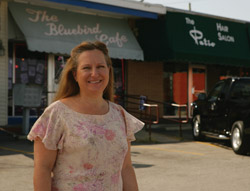
|
As the songwriting process unfolds at the Bluebird,
so do all the other steps that happen before a
hit reaches the radio, TV, and the Internet—audiences
respond, writers collaborate and revise, execs
and managers take meetings, artists record demos,
and marketing teams put together the whole package.
But you don’t play at the Bluebird without
making it past Kurland.As the gatekeeper to Nashville’s
most respected songwriter showcase, her taste
and point of view shape who plays, who listens,
what sells, and what the world hears.
Fortunately for the world, Kurland has a good
ear. Countless songwriters and artists warmed
up at the Bluebird—Kathy Mattea, Faith Hill,
and Vince Gill among them. But nowhere is Kurland’s
influence more obvious and universal than the
career of Garth Brooks, who became a featured
writer and performer at the Bluebird in the mid
’80s. Brooks heard the song that would become
his first hit, “The Dance,” penned
by Tony Arrata, at the Bluebird, when Arrata performed
it in a showcase.
“I could not picture my life without the
song or the songwriter,” Brooks writes in
The Bluebird Cafe Scrapbook: Music & Memories
from Nashville’s Legendary Singer Songwriter
Showcase, which Kurland co-edited with Mark
Benner and Neil Fagan. “The Bluebird gave
me both.”
Brooks made it big, in some categories outselling
Elvis and every other individual performer in
history—his sales are comparable to those
of the Beatles. And after Brooks, country music—all
of music, actually—will never be the same.
His boundless appeal helped to break down genre
barriers and opened the cross-promotional, collaborative
doors that remain open today. Mass appeal is what
the labels still look for and is in part what
makes collaborations such as rap star Nelly and
country favorite Tim McGraw’s “Over
and Over” so successful. Broad appeal catapulted
a number of female solo country artists—namely
Shania Twain, Yearwood, and Hill—into the
limelight in the ’90s, paving the way for
the young female voices of today.
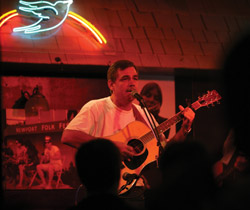
Songwriters are
stars at the Bluebird, which celebrates
the craft.
|

|
“The whole music business is absolutely
in turmoil—it’s a wonderful thing
because radio stations still are genre-directed,
but nothing else is,” Kurland says. “Big
labels know they can’t afford to be in one
genre. The big labels every day become less powerful.
You so seldom hear about someone unknown being
signed to a major label; but you so often hear
someone say, ‘Go to my MySpace page, I’ve
gotten thousands of page views.’
“Luckily, I’m not in the thick of
having to pick the next big star. We are here
for the songwriters to show off their wares. These
songs happen before anybody categorizes what they
are, which is great because a good song can take
10 years to get on the radio.”
In a way, Kurland’s voice is heard in
the music born at the Bluebird. “I wish
I could sing and play guitar, and I cannot. But
I get to have a career in the music business that
makes me part of the good songs that are on the
radio; part of having audiences go crazy at shows,”
she says. “That’s almost as good—maybe
better—than being the one doing the singing.
I’m part of making the music.”
Music and performance run in Kurland’s
blood. Awards her father, Sheldon, won for work
on Music Row grace the walls of the venue among
headshots of songwriters and artists who perform
at the Bluebird. Shelly Kurland Strings, which
he founded, was a highly regarded group often
requested for recording sessions on Music Row.
Kurland’s mother started a theater group
near where the Bluebird now stands when Kurland
was growing up. Kurland’s parents supported
the Bluebird from the beginning, though her father
warned her not to include a stage in the cafe,
as he thought people wouldn’t want to be
bothered with music while they ate.
Kurland’s upbringing played a hand in
developing an important tool in recognizing good
music—her gut.
Following her intuition has served Kurland well,
at least in the long run. Growing up in Nashville
and in upstate New York, Kurland came to GW because
friends were nearby and she was interested in
politics. “We made so much use of the city.
I was in the museums, on the Mall, and in Georgetown
every weekend,” Kurland says. During her
sophomore year, Kurland became interested in cooking
(a skill she developed by using butter and sugar
packets pilfered from the Thurston Hall cafeteria
to make cookies) and the restaurant business.
She decided to finish her bachelor’s degree,
double-majoring in American studies and American
literature, largely, she explains, because the
coursework was flexible and fit her broad interests.
“The fact is that it wasn’t my intention
at all, but an American studies degree fits in
perfectly with a career that’s about country
music and songwriting,” Kurland says. “I
think that education, that way of thinking about
things, has made me a better person to understand
country songs, and that’s what I do for
a living, I’m around songwriters.”
After graduating and briefly operating a bakery
in Nashville, Kurland attended the Culinary Institute
of Washington. “I went back to Nashville
as a GW grad and a cooking school dropout,”
Kurland recalls. “After hanging around nightclubs
and learning to love country music at a hot dog
place, I opened a restaurant as a naïve 25-year-old.
I credit no sense or anything else for my success,
just flat-out stupidity and bravado. The musicians
I knew from bars said, ‘Why don’t
you put in a stage?’ and I agreed because
it gave me a chance to be around more guys who
play guitars.”
In Nashville, when it comes to music venues
with open mics, it’s not “if you build
it, they will come” so much as “if
you build it, they will help you build it, and
then they will come and keep coming.” From
the very first night, the Bluebird has been packed.
With success came responsibilities, and Kurland
found she had a lot to learn about running a business.
She took classes in small business management
at a community college in Nashville; there, she
picked up a piece of invaluable advice.
“I learned that you’ve got to find
one thing to be, and to be the best at that one
thing,” Kurland says. “So we focused
on showcasing good songwriters.”
That simple decision changed the country music
industry.
Stars Go Blue

|
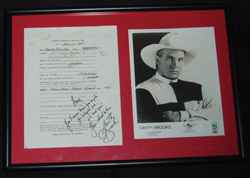
Garth Brooks’
audition sheet, autographed for Kurland.
|
Though Kurland says she didn’t see a dime
from running the Bluebird until after it had been
open for six years, its impact on audiences and
performers was immediate and deep.
“The Bluebird completely changed the way
writers were viewed on Music Row. It also brought
the creative people who had been in the shadows
for so many years to the attention of the public
who had never thought about who wrote the songs
they heard on the radio,” artist Karen Staley
says. “At the Bluebird people come to listen
to music—not to just use it as background
noise for conversation. People really respond
to the purity of the creator of the song interpreting
it the original way it was intended.
“Everyone loves to play the Bluebird,”
she continues. “That’s why everyone
from T. Graham Brown to Faith Hill to Garth Brooks
and scores of others knew that if they were going
to get their name out on the Row, the place to
be seen was the Bluebird. It was automatic clout.”
Kurland, too, has built a solid reputation on
and off Music Row. She’s proud of her venue
and the artists it showcases. And while many are
quick to point out its untapped potential (read:
expansion and commercialization), Kurland definitely
thinks the ’Bird ain’t broke.
“We get asked the question about expanding
all the time, but nobody’s ever offered
me the money to expand,” Kurland says. “I
decided years ago that it is best for the people
who play here to play in a small environment.
“We really work with brand-new songwriters
right off the turnip truck, and you don’t
want to put them in front of 300 people. Even
more, you don’t put them in a room that
seats 300 people, but only has 10 people in it.
Seventy-five to 100 seats is perfect. If only
25 people show up, it doesn’t feel empty;
and if it’s crowded, everybody thinks they’re
having a great night.”
Because of its reputation and popularity, the
Bluebird has had to cut back on its large-scale
open auditions, holding them only four times a
year. Open mic nights on Mondays are always packed.
But Kurland is quick to point out that hers is
not the only place in town to gain exposure—the
Bluebird is part of a Nashville network.
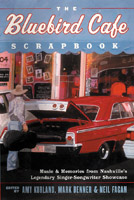 “You
come in on a Monday, put your name in the hat,
if you get your name drawn, you get to play two
songs for a great audience, and right away, you
get your career started. People will hear you,
talk to you, offer you advice,” Kurland
says. “But there are other open mics around
town, and I’ve never told anybody otherwise.
I tell people to go play everywhere, play all
over town, and being here is just part of the
process. Nashville is Songwriter University.” “You
come in on a Monday, put your name in the hat,
if you get your name drawn, you get to play two
songs for a great audience, and right away, you
get your career started. People will hear you,
talk to you, offer you advice,” Kurland
says. “But there are other open mics around
town, and I’ve never told anybody otherwise.
I tell people to go play everywhere, play all
over town, and being here is just part of the
process. Nashville is Songwriter University.”
While she wants to keep the Bluebird physically
small, Kurland enjoys exploring its potential.
“I’m interested in expanding my
reach. There are other ways to reach people than
just running a bigger club in Nashville.”
The Bluebird sponsors nationwide tours, hosts
numerous charity benefits, develops partnerships
with travel destinations including Disney World
and a ski resort in Montana. It has been the setting
of a weekly music television program on Turner
South. This was the fourth summer the Bluebird’s
music was featured in a series at Robert Redford’s
Sundance Resort. In 1994, Paramount Pictures released
The Thing Called Love, starring Sandra
Bullock and Samantha Mathis, about a group of
singer-songwriters based at the Bluebird.
Though the film—and the occasional reporter—perpetuated
a few stereotypes about everyone in Nashville
wearing cowboy hats, Kurland has enjoyed the Bluebird’s
visibility and successes. And she’s left
its momentum unchecked. “I’m an old-fashioned
owner who doesn’t have a phone bank, doesn’t
have Ticketmaster, and doesn’t have a glass
case in the front with T-shirts in it. But if
you’re willing to wait on the phone with
a busy signal to get tickets, and if you can get
in the door, we want you here and we hope you
come back.”
Long Time Gone
Part of what keeps music lovers coming back
to the Bluebird is the chance to hear new music
not yet on the radio. What is on the radio right
now by and large leaves Kurland cold.
“Country music is in the middle of a stupid
phase, a phase that is probably on its way out,”
Kurland says. “The part of ‘country
culture’ that a lot of music chooses to
celebrate right now is ‘let’s get
drunk and drive our cars real fast.’
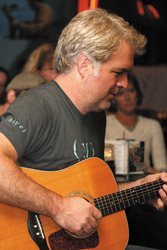
Rivers Rutherford
“in the round,” singing hits
he wrote for artists including Tim McGraw.
|

|
“You hear a song like [Montgomery Gentry’s]
‘Hell Yeah’ or [Gretchen Wilson’s]
‘Redneck Woman’ right now, basically
a song that says, ‘I don’t care what
you think of me—my kind of people are running
this country’—and in some ways, that’s
great, because everybody deserves their day in
the sun, and people who respond to that music
perhaps have felt ignored for a long time. But
I think our country, and music, is swinging back
to caring about the environment, taking responsibility
for our children, and I would be surprised if
we don’t start to hear more songs about
taking care of each other.”
This isn’t the first period of dramatic
change country music has experienced, nor will
it be the last. Everything from the invention
of the radio to world events have changed the
music, and country’s ebb and flow toward
and away from its “roots”—if
those can be traced and quantified—is a
familiar theme. Whether country is or belongs
to genres such as folk or bluegrass is debatable.
Whether it will be annexed by pop is, to some,
a frightening thought. Blurred genre lines, while
making for better sales, also make it harder to
answer the question: Who, and what, is country?
Wherever the music has been, it’s been
celebrated in Kurland’s venue. Wherever
the music is headed, the foundation of change
will be laid at the Bluebird.
When the Lights Go Down
On a Friday night in August, when the stars
are out at the Grand Ole Opry with a crowd 4,000
strong, the hottest ticket in town is at the Bluebird,
where four men and their guitars are sitting in
the center of the room, telling the stories of
their lives—and your life, too—to
a packed house of about 100. Rivers Rutherford,
Brett James, Cole Deggs, and Jim Collins write
songs for Martina McBride, Keith Urban, Carrie
Underwood, and Tim McGraw. If you’re lucky
enough to catch a performance “in the round”
at the Bluebird, you’ll hear the stories
behind the songs from writers who love to perform—and
even for diehard country fans, to listen is to
be surprised.
Take Collins’ “She Thinks My Tractor’s
Sexy,” a big record for Kenny Chesney, with
its relentless percussion, unapologetic twang,
and a healthy dose of pop gloss. Stripped down
to the songwriter and his guitar, with backup
vocals from the crowd, there’s a charm and
a tongue-in-cheek humor that got lost in big label
translation. Songs that have been exhausted by
airplay—and ubiquitous American Idol covers—are
reborn, and the men who are singing them aren’t
stars by Billboard standards, but are deeply appreciated
by the audience. (Appreciation at the Bluebird
often comes in the form of beers and tequila shots
sent over by fans.)

|
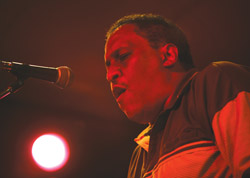
An open-mic performer
on the Bluebird’s small—but
legendary—stage.
|
Calling Kurland the “den mother”
of established and up-and-coming songwriters alike,
Rutherford says part of the magic of the Bluebird
comes from putting the songwriters front and center—after
all, many of them first came to Nashville in hopes
of becoming recording artists. “She gives
people behind the scenes a chance to be in the
spotlight,” Rutherford says. And the crowd
is in the spotlight as well, singing along, calling
out requests, drumming on tables and clapping,
becoming a part of the music.
Sitting at small, candlelit tables, leaning
against the bar, and packed into three mismatched
church pews over in the corner, tonight the crowd
is made up of music lovers from California, tourists
from Chicago, singer-songwriters, and Clay Bradley,
vice president of artists and repertoire of Columbia
Records, who is gamely fielding cracks from Rutherford
and crew.
In a few hours, the human condition has been
sung and strummed: love, heartbreak, sex, and
laughter; children, God, America, and war. This
is the Bluebird. And—movies, books, articles,
tours, stars aside—this has been the Bluebird
since the doors first opened: music, stories,
writers, audiences who love real music. And while
Kurland has always recognized and executed opportunities,
nights like these will never change. The past
and present of music are found within the Bluebird’s
walls, and the future is in the notes ahead, songs
unwritten.
|